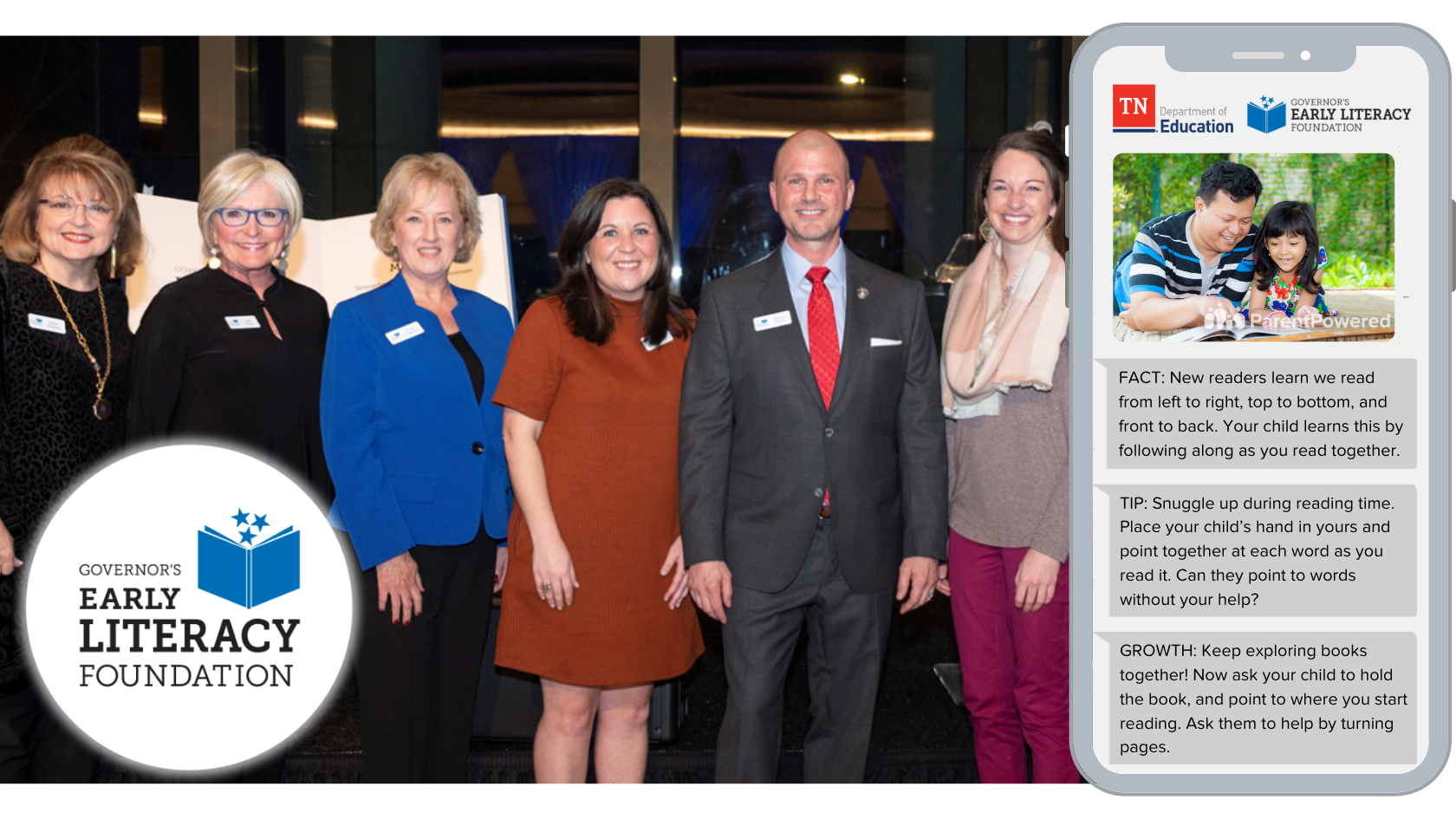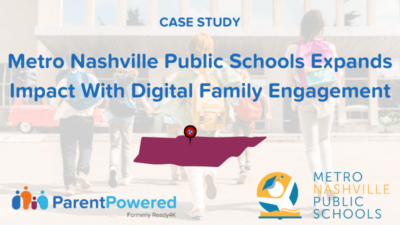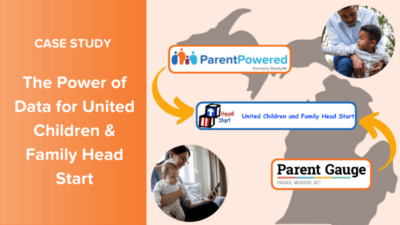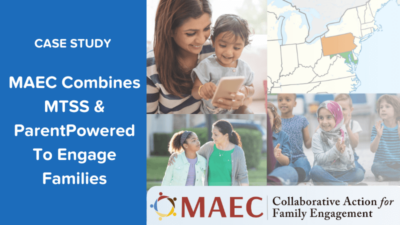By Mary Westervelt, director of marketing and communications
James Pond, president of Governor’s Early Literacy Foundation (GELF), knows that strong foundations require both bricks and mortar. That’s why his team at GELF focuses on knowing their community and connecting and cementing opportunities to grow early literacy success in Tennessee.
So when a global pandemic hit in 2020, GELF’s commitment to collaboration and understanding the work (and needs) of the Tennessee early literacy community meant they were ready to act. Even with schools shuttered, they were able to swiftly identify the just-right solutions and get them into the hands of over 160,000 families across Tennessee.
This is the story of how a small team with a clear focus, and an unwavering commitment to helping Tennessee children grow and thrive, achieved the extraordinary.
Understanding the Community
GELF was founded in 2004, with a focus on ensuring access to books for all children ages birth to 5. Through continuous relationship building, they were able to ensure that families across all 95 counties were able to participate in their book distribution program. As a successful, trusted literacy partner across Tennessee, GELF was ready and able to evolve their work.
“We redefined our vision to provide the resources, guidance and support that children and families need to create life-long learners,” says Pond. “It was about building and growing early literacy support. I wanted our foundation to grow as a partner in seeing third grade reading scores go up.”

GELF sees early literacy as a bedrock to the overall wellbeing of the state. “Tennessee is a fast growing state, with lots of companies moving in. Those companies need a qualified workforce, and literacy is essential to building that. When you invest in early literacy, you’re investing in your workforce.”
In addition to partnering with the Tennessee Department of Education’s literacy campaign, which at the time was Read to be Ready, and expanding their target age range from birth-to-5 to birth-to-third grade, they set out on a listening tour of their own.
Their goal was to understand the essential bricks to which they could be the mortar. “It was apparent there was a lot of opportunity to grow, because the foundation had done such a phenomenal job of building relationships across the state,” says Pond. “We talked to everyone from educators to the nonprofit sector. We wanted to know where the gaps were in early literacy. Which supports were missing?”
“We’ve all miscalculated how desperately families really wanted something like this.”
James Pond, GELF President
After criss-crossing the state and talking with folks from all Tennessee communities, GELF identified two essential opportunities:
- Providing families with quality resources
- Increasing caregiver support
“Caregivers are the most overlooked group, even though they’re a child’s first teacher and the person who has the most contact with that child throughout their lifetime,” says Pond. “We also know from years of research that when caregivers spend 20 minutes reading with their child every day, that child has a much higher chance of success than in a home where books aren’t being read.”
Of course, book distribution was already a strength of GELF, through their 15 years of experience facilitating Dolly Parton’s Imagination Library in Tennessee. So they collaborated with Scholastic to expand their book distribution programming and set out to find strategies for providing caregiver engagement, as well.
Adding Caregiver Engagement
As program manager for the K-3 GELF program, Paige Atchley is responsible for implementing their vision to support children in the early elementary years. “Only 35% of Tennessee students leave third grade on reading level,” says Atchley. “It’s our goal to keep supporting children in those early elementary years to create lifelong learners and build literacy skills.”
The initial K-3 caregiver initiative involved partnering with local university researchers and 36 school districts. All families would be given books and some families would also be enrolled in a digital caregiver engagement program. This research program was set to launch in the spring of 2020. Like with so many plans, the arrival of COVID quickly changed the blueprint.
“We decided that to provide as much support as possible, the caregiver engagement tool would be extended to all families in the pilot,” says Atchley.
Finding the Right Engagement
Now the challenge was to find a caregiver engagement solution that would meet the moment. “We knew caregiver support was something we had to pursue, that there was more learning to be done, and more we didn’t know,” says Pond. “So I sent Paige on a mission and told her ‘find us something great.’”
Atchley set to work researching virtual family engagement programs that could achieve their goal. After a summer pilot with another program didn’t deliver the results they were looking for, Atchley heard Dr. Benjamin York, founder of ParentPowered, speak at a Campaign for Grade Level Reading event. She decided this was the program they needed.
“I think that the unprecedented time that we’re living in gave districts a renewed sense of urgency to provide meaningful support without increasing the workload of their employees.”
Paige Atchley, GELF K-3 Program Manager
“After a conversation with the ParentPowered team, she called me and said ‘this is what I want to use.’ I told her to sell me on it,” says Pond.
Their experience with the earlier program, which required internet access and more proactive caregiver engagement, informed their decision. They saw text messages as offering the greatest accessibility.
“ParentPowered overcomes a number of issues. It overcomes broadband, which makes it extremely accessible. 98% of people across the country have access to a phone they can text on,” says Pond. “And a text is a short, simple engagement that quickly allows that parent to have a learning moment with that child.”
Enrollment Begins
Soon after the GELF team reached out, they and the ParentPowered team put their heads together to explore the best way to serve as many families as possible, as quickly as possible. While they were having conversations, GELF was also in the process of contracting with 75 school districts to provide a book delivery program for Kindergarten-third grade students.
“Weezie [Hough, ParentPowered director of strategic relationships] and Paige went into a brainstorming meeting to talk about rollout strategies. Someone asked the right question, and Weezie said ‘oh, there’s an FCC ruling that allows districts to enroll parents [in messaging programs closely related to the district mission], and then they can opt out if they want to,’” says Pond. “It just opened the floodgates up.” The GELF team committed to using their district outreach to make direct enrollment a reality.
They leveraged the book delivery data sharing agreement and included the necessary contract language that poised each district to seamlessly offer ParentPowered to their families. Although it was in the contract, districts were not required to offer ParentPowered programs; however, because of its curricular alignment and ease of implementation, almost every district chose to enroll families directly as a component of their academic programming.
At the same time, GELF was in discussions with the Tennessee Department of Education (TDOE) about collaborating on early literacy support during COVID. “We worked with the TDOE who aligned the curriculum to the Tennessee English Language Arts standards,” says Pond. “We are all looking to give families something that’s going to help kids on their learning journey.”
After bringing the TDOE in as a partner, the potential number of families served rapidly began to grow. “The TDOE was pivotal in getting the word out,” says Atchley. “They shared information widely about ParentPowered, and school districts were interested immediately.” Interestingly, there was not a ‘typical’ type of district that hoped to use ParentPowered. “We fielded requests from our most rural to most urban districts; ParentPowered presented itself as a tool that everyone thought would benefit their families.”
Pond also credits Atchley’s commitment to serving every family. “Paige went to town! She’s a high energy person who loves what she’s doing and she wanted to see every single child in this state benefit from this program.”
Expanding to Meet Demand
While the original enrollment goal was set at 55,000 families, the number grew and grew as districts heard about the program and requested to participate. “We quickly saw that we were going to go past the enrollments we originally purchased,” Atchley says, and the stretch-goal of reaching 75,000 families was quickly eclipsed and revised.
“I think that the unprecedented time that we’re living in gave districts a renewed sense of urgency to provide meaningful support without increasing the workload of their employees,” says Atchley. “They know families want and need more help, and this tool allows them to provide it without adding one more thing to teachers’ or principals’ responsibilities.”
As mission-driven organizations, GELF, the TDOE, and ParentPowered were all committed to ensuring as many districts as possible, at as many grade levels as possible, were able to participate.
“We’ve been blown away by the response to this initiative,” said Ben York, Ph.D., founder and CEO of ParentPowered, formerly known as Ready4K. “To have so many districts join the program shows that GELF and TDOE deeply understand the needs of the Tennessee education community. It’s a strong testament to their ability to respond to the moment.”
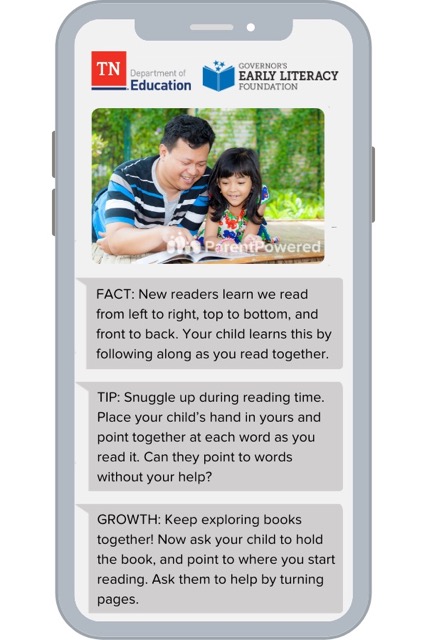
After several months of preparing the Tennessee ParentPowered program, outreach to districts, and family enrollment, the program officially launched on January 11, 2021 by sending over 140,000 welcome messages to families across the state.
“When we launched, ParentPowered gave us an estimate of the number of opt-outs and non-working numbers. But it was not even close! We’ve all miscalculated how desperately families really wanted something like this,” says Pond. “You can just see the practical nature of these texts. And parents have really responded, because they’re not opting out or complaining to the district. It’s been a really positive response. It’s been a fantastic journey. We had no idea it would be this big.”
To date, more than 163,000 families are receiving text messages, and the number is still growing.
Looking forward
For the GELF team, getting families started was an important first step. Now they’ve turned their attention to the future. And as the cement in the foundation of early literacy in Tennessee, that means keeping the bricks in place.
“I feel a weight and an obligation to make a difference in the next several years. I’m looking for the programs and partnerships that are going to move the needle,” said Pond. “I came into this work with a strong charge to make a difference. If it doesn’t make a difference, it’s not a have-to-do. What are those have-to-dos? ParentPowered seems like one of those things that’s really going to make a difference.”

